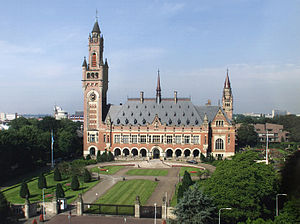 In 2001, the Permanent Court of Arbitration acknowledged that, “in the nineteenth century the Hawaiian Kingdom existed as an independent State recognized as such by the United States of America, the United Kingdom and various other States, including by exchanges of diplomatic or consular representatives and the conclusion of treaties (Larsen v. Hawaiian Kingdom, 119 Int’l L. Rep. 566, 581 (2001).” As an independent state, the Hawaiian Kingdom was a subject of international law, which prohibited intervention in its domestic affairs by other states. According to Brownlie,
In 2001, the Permanent Court of Arbitration acknowledged that, “in the nineteenth century the Hawaiian Kingdom existed as an independent State recognized as such by the United States of America, the United Kingdom and various other States, including by exchanges of diplomatic or consular representatives and the conclusion of treaties (Larsen v. Hawaiian Kingdom, 119 Int’l L. Rep. 566, 581 (2001).” As an independent state, the Hawaiian Kingdom was a subject of international law, which prohibited intervention in its domestic affairs by other states. According to Brownlie,
“The principal corollaries of the sovereignty and equality of states are: (1) a jurisdiction, prima facie exclusive, over a territory and the permanent population living there; (2) a duty of non-intervention in the area of exclusive jurisdiction of other states; and (3) the dependence of obligations arising from customary law and treaties on the consent of the obligor (Ian Brownlie, Principles of Public International Law 287 (4th ed. 1990).”
Should a state seek to merge into another state, international law only allows it through cession. “Cession of State territory is the transfer of sovereignty over State territory by the owner-State to another State (L. Oppenheim, International Law, vol. 1, 499 (7th ed. 1948),” says Oppenheim. “The only form in which a cession can be effected is an agreement embodied in a treaty between the ceding and the acquiring State. Such treaty may be the outcome of peaceable negotiations or of war (Id., at 500).” Through peaceful negotiations, the United States acquired by treaty, the former territories of the French in Louisiana in 1803 (8 U.S. Stat. 200), the Spanish in Florida in 1819 (8 U.S. Stat. 252), the British in Oregon in 1846 (9 U.S. Stat. 869), the Russian in Alaska in 1867 (15 U.S. Stat. 539), and the Danish in the Virgin Islands in 1916 (39 U.S. Stat. 1706). The United States acquired, through treaties of conquest, the former territories of the British in the Americas in 1783 (8 U.S. Stat. 80), the Mexicans in territory north of the Rio Grande in 1848, which includes Texas (9 U.S. Stat. 922), and the Spanish in the Philippines, Guam and Puerto Rico in 1898 (30 U.S. Stat. 1754). Hawai‘i is the only territory the United States claims without a treaty.
International law also distinguishes between the state and its government, where the latter is the physical manifestation that exercises the sovereignty of the former. Hoffman emphasizes that a government “is not a State any more than man’s words are the man himself,” but “is simply an expression of the State, an agent for putting into execution the will of the State (Frank Sargent Hoffman, The Sphere of the State or the People as a Body-Politic 19 (1894).” Wright also concluded, “international law distinguishes between a government and the state it governs (Quincy Wright, The Status of Germany and the Peace Proclamation, 46(2) Am. J. Int’l L. 299, 307 (Apr. 1952).” Therefore, a sovereign State would continue to exist despite its government being overthrown by military force. “There is a presumption that the State continues to exist, with its rights and obligations…despite a period in which there is no, or no effective, government,” explains Crawford. “Belligerent occupation does not affect the continuity of the State, even where there exists no government claiming to represent the occupied State (James Crawford, The Creation of States in International Law 34 (2d ed. 2006).” Crawford states,
“The occupation of Iraq in 2003 illustrated the difference between ‘government’ and ‘State’; when Members of the Security Council, after adopting SC res. 1511, 16 October 2003, called for the rapid ‘restoration of Iraq’s sovereignty,’ they did not imply that Iraq had ceased to exist as a State but that normal governmental arrangements should be restored (Id.).”
The Hawaiian Kingdom Civil Code provides, “The laws are obligatory upon all persons, whether subjects of this kingdom, or citizens or subjects of any foreign State, while within the limits of this kingdom, except so far as exception is made by the laws of nations in respect to Ambassadors or others. The property of all such persons, while such property is within the territorial jurisdiction of this kingdom, is also subject to the laws (Hawaiian Kingdom Civil Code, §6 (Compiled Laws 1884).” The Hawaiian Kingdom Penal Code defines treason “to be any plotting or attempt to dethrone or destroy the King, or the adhering to the enemies thereof, giving them aid and comfort, the same being done by a person owing allegiance to this kingdom (Hawaiian Kingdom Penal Code, Chapter VI, sec. 1 (1869).” For any person committing the crime of treason “shall suffer the punishment of death; and all his property shall be confiscated to the government (Id., at sec. 9).”
On January 16, 1893, the United States intervened in the internal affairs of the kingdom when its diplomat—Minister John Stevens, ordered the landing of U.S. troops to actively participate in the treasonous take over of the Hawaiian government. The following day, U.S. troops forcibly removed the executive Monarch—Queen Lili’uokalani, and her Cabinet of four ministers, and replaced them with insurgents led by Hawai‘i Supreme Court Judge Sanford Dole. The insurgents’ proclamation of January 17, 1893 stated:
“All officers under the existing Government are hereby requested to continue to exercise their functions and perform the duties of their respective offices, with the exception of the following named person: Queen Liliuokalani, Charles B. Wilson, Marshal, Samuel Parker, Minister of Foreign Affairs, W.H. Cornwell, Minister of Finance, John F. Colburn, Minister of the Interior, Arthur P. Peterson, Attorney-General, who are hereby removed from office. All Hawaiian Laws and Constitutional principles not inconsistent herewith shall continue in force until further order of the Executive and Advisory Councils (Robert C. Lydecker, Roster Legislatures of Hawaii 188 (1918).”
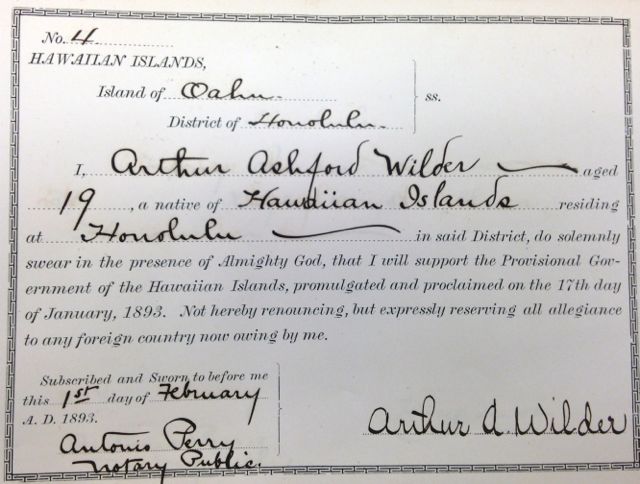
Once the regime change was effected, all government officers and employees were forced to sign oaths of allegiance or face termination or arrest. This being done under the oversight of U.S. troops after Minister Stevens declared Hawai‘i to be an American Protectorate on February 1, 1893. The purpose of the regime change was for the provisional government to cede, by treaty, Hawai‘i’s sovereignty and territory to the United States.
One month after the treaty of annexation was signed in Washington, D.C., on February 14, 1893, under President Benjamin Harrison and submitted to the Senate for ratification, President Grover Cleveland, Harrison’s successor, withdrew the treaty and initiated an investigation into the overthrow of the Hawaiian Government. President Cleveland concluded that the provisional government was neither de facto nor de jure, but self-declared (United States House of Representatives, 53d Cong., Executive Documents on Affairs in Hawai‘i: 1894-95, 453 (Government Printing Office 1895), and the U.S. “military demonstration upon the soil of Honolulu was itself an act of war (Id., at 451).” The President then notified the Congress that he began executive mediation with the Queen to reinstate her and her Cabinet of ministers on condition she would grant amnesty to the insurgents. The first of several meetings were held at the U.S. Legation in Honolulu on November 13, 1893 (Id., at 1241-43). An agreement was reached on December 18, 1893 (Id., at 1269-73), but President Cleveland was unable to get Congressional authorization for the use of force in order to redeploy the troops to Hawai‘i. The agreement was not carried out. This executive agreement is recognized under international law as a treaty.
On July 4, 1894, the insurgency declared the Provisional Government to be the Republic of Hawai‘i and continued to have government officers and employees sign oaths of allegiance under threat by American mercenaries who were employed by the insurgency. The proclamation of the insurgents stated,
“it is hereby declared, enacted and proclaimed by the Executive and Advisory Councils of the Provisional Government and by the elected Delegates, constituting said Constitutional Convention, that on and after the Fourth day of July, A.D. 1894, the said Constitution shall be the Constitution of the Republic of Hawaii and the Supreme Law of the Hawaiian Islands (Lydecker, at 225).”
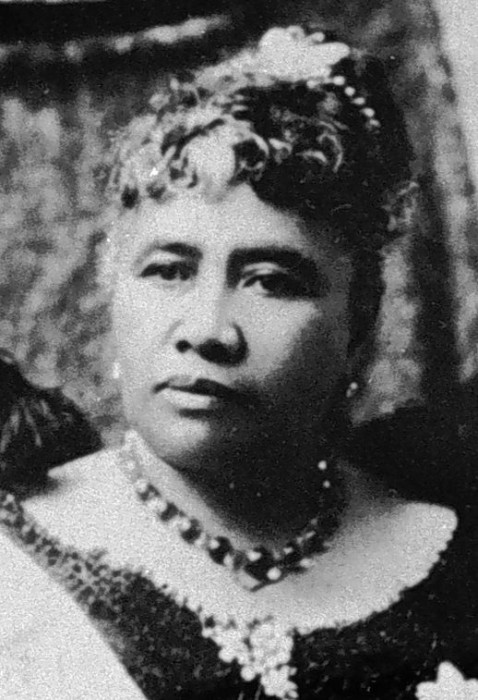 On June 17, 1897, the day after a second treaty of annexation was signed in Washington, D.C., under President William McKinley, Cleveland’s successor; Queen Lili‘uokalani submitted a formal protest to the U.S. State Department. Her protest stated,
On June 17, 1897, the day after a second treaty of annexation was signed in Washington, D.C., under President William McKinley, Cleveland’s successor; Queen Lili‘uokalani submitted a formal protest to the U.S. State Department. Her protest stated,
“I declare such a treaty to be an act of wrong toward the native and part-native people of Hawaii, an invasion of the rights of the ruling chiefs, in violation of international rights both toward my people and toward friendly nations with whom they have made treaties, the perpetuation of the fraud whereby the constitutional government was overthrown, and, finally, an act of gross injustice to me.”
President McKinley ignored the protest and submitted the treaty to the Senate for ratification. Additional protests were filed with the Senate from the people, which included a 21,269 signature-petition of members and supporters of the Hawaiian Patriotic League protesting the annexation of Hawai‘i. By March of 1898, the treaty is dead after the Senate was unable to garner enough votes for ratification.

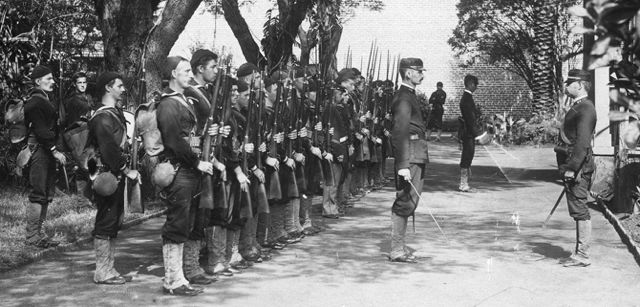
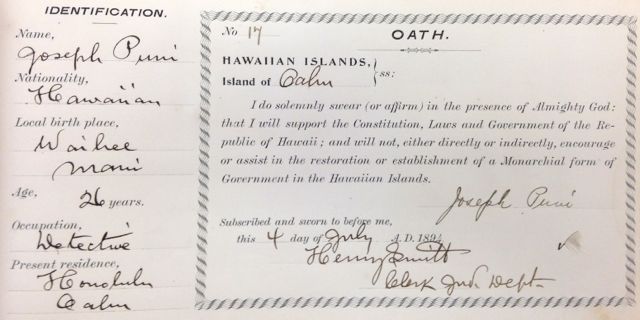
history clearly provides details that “we are the evidence and not the crime” .
Seems to me this explains that this whole problem comes down to process. The treaty process was bypassed and that is why the US takeover of Hawai’i was illegal.
“The only form in which a cession can be effected is an agreement embodied in a treaty between the ceding and the acquiring State. Such treaty may be the outcome of peaceable negotiations or of war (Id., at 500).”
These two sentences are defining to me. The first sentence seems to prove the pro-kingdom side of the argument. Here is where I get so frustrated…the second sentence clearly states that the treaty may be the outcome of peaceable negotiations or of WAR. So would the kingdom supporters be happier, or feel less injustice had the US declared war, slaughtered everyone, and then with no apologies LEGALLY take your land? It is always easy to look at was and complain about will never be. I try to look at what is and what could have been. What could have been was an all out war between the US and Hawaii.
To answer your question Reid, “YES” I personally and I speak only for myself, would be more satisfied and accept the fact that we as a proud people fought the United States in a war that could have cost lives to retain our independence as a recognized sovereign country, but again that’s just me.
Many say it might have been different had there been a King on the thrown and that may have been true. Many Hawaiian’s might have died in a war, but they would have died fighting to stop a greedy bunch of Americans from stealing there country. This is no different than Americans fighting for there country and dying to protect there way of life.
In her wisdom and she was way ahead of her time in diplomacy, Queen Liliuokalani chose the path of peace to try and achieve justice for her people and I do believe today it was the right thing to do in order to avoid blood shed, also considering there were only forty thousand Kanaka left.
In its arrogance the United States dismissed the fact that on two occasion’s treaties of annexation were proposed and both times were stopped. An intelligent person would have viewed this as a people not wanting annexation to the United States, but in the American way and not taking “No” for an answer, the U.S. Congress came up with another plan to steel our country in the form of a Joint Resolution. In spite of numerous testimonies by honest congressmen informing there ignorant colleagues that a joint resolution cannot acquire another country and it was in violation of there own constitution, congress still moved forward with the resolution claiming to annex Hawaii.
A joint resolution, however, is not a treaty or agreement between two States, but rather an agreement between the House of Representatives and the Senate in Washington, D.C. A joint resolution is a municipal law of the United States whose effect is limited to United States territory. The United States Supreme Court, The Apollon, 22 U.S. 362, 370 (1824), affirmatively stated, that the “laws of no nation can justly extend beyond its own territory” for it would be “at variance with the independence and sovereignty of foreign nations” In U.S. v. Belmont, 301 U.S. 324, 332 (1937), the Court also stated that, “our Constitution, laws and policies have no extraterritorial operation.” And in United States v. Curtiss-Wright Export Corp., (1936), the Court concluded, “Neither the Constitution nor the laws passed in pursuance of it have any force in foreign territory unless in respect of our own citizens; and operations of the nation in such territory must be governed by treaties, international understandings and compacts, and the principles of international law…. [T]he court recognized, and in each of the cases cited [involving the exercise of the sovereign power of the United States] found, the warrant for its conclusions not in the provisions of the Constitution, but in the law of nations.”
If a joint resolution is limited to United States territory, how can a joint resolution annex a foreign State? Simply answered, it can’t and it didn’t.
Again, this is just my personal answer to your question about war with the U.S. in 1893 to protect our country.
A Hui Hou
It really would’ve been better that a war had taken place. I could accept the fact that we lost a war, but I cannot accept that we are a stolen kingdom!!! It’s always easy to say what coulda, woulda, shoulda, but this isn’t 2nd grade, this is INTERNATIONAL LAW, which the United States seems to be above. When Iraq was conquered, and overthrown, why didn’t the U.S. claim it as their own??? They were quick to restore the government when its sovereignty was called into focus.
Aloha Derek
If a war had taken place, meaning by the H.K. and the USA are violently fighting each other, there is no question that the H.K. would lose and worst of all the terms of surrender by the U.S. would be that Hawaii would be ceded to the dominion of the United States. And not only would that be legal, we wouldn’t be using the term occupation, furthermore, this blog would not exist.
Like they say I will tell the whole truth not thing but the truth so help me GOD . If we say what we should be saying then god will be good . this is why we are at a conflict with the united state of America . Just tell us the whole truth not thing but the truth . Is it because the whole world now known that the Hawaiian kingdom is still alive and well . And time is running out . Our kupu’na mo’i our kupu’na alii and our kupu’na maka’ana’na are in us unit this present day . And to see what’s going on today not looking good . Like I always say legal unit you get caught . Be safe take care love u all . pala’aina kaniela nae’ole na’auao on maui
Reid, the failure to obtain a Treaty is not the only problem. The unauthorized intervention and landing of U.S. Troops to back insurgents of a fake revolution was the big problem. It violated international law and the HK U.S. treaty of friendship.
Hawaii is neutral and protected under the laws of neutrality. You cannot invade a neutral country and expect to extinguish it with or without violence. Especially if their is no engagement by the neutral state. If the U.S. chose to slaughter the HK gov’t that would be prima facia of occupation. It would ruin the U.S. illusion the revolt was by the Hawaiians and not by U.S. military. It would definetly prevent them from annexation in any way shape or form. If you read carefully you will find that the U.S. gave instructions not to use violence in this plot. So Your statements about a war or violence does not make any sense.
Aloha Derek, I understand your fustration but the objective of what the U.S. needed to accomplish in Iraq is different than their objective was for Hawaii.
Iolani is spot on that Hawaii would have been lost forever as a result of a Treaty of surrender. Our Queen was wise and protected our country and it’s status by choosing the diplomatic path. We now have the oppurtunity to end the occupation so we can live free and she can rest in peace.